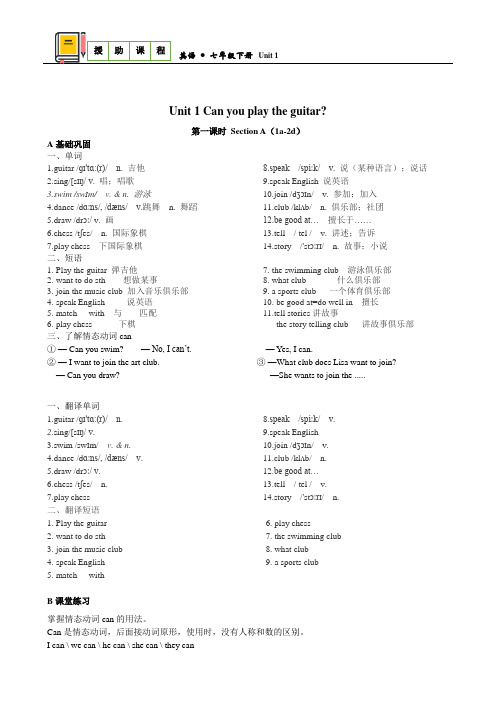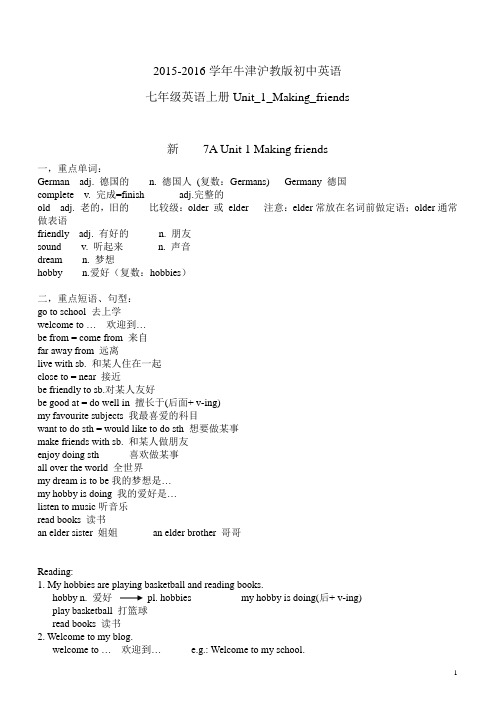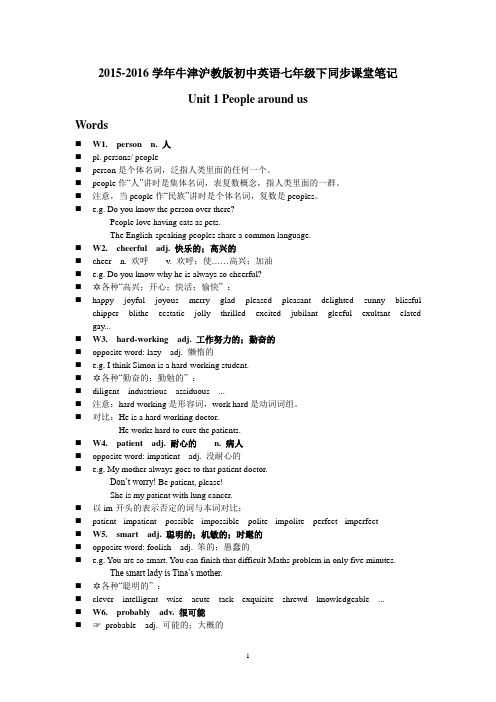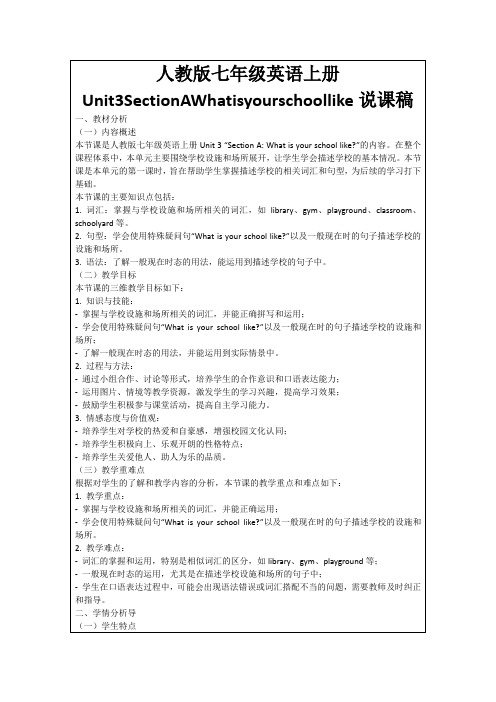2015-2016学年人教版英语七上课件Unit 1 第一课时.ppt
《高分突破》2015-2016学年人教版英语七年级下册课件Unit1第一课时

join the English club. ___你__想__加_入__什__么__俱__乐__部_?_我__想__加__入__英_语__俱__乐__部__。__
课堂小测
一、根据中文意思或首字母提示,用单词的适当形 式填空,每空一词。
课堂小测
三、单项选择。
( B ) 11. I can play ______ piano, but I can’t play
_______ football.
A. the; a B. the; / C. /; the
D. a; the
(A ) 12. You want to learn English well, so you
课后作业
She is also good at 9 . She does well in all her lessons. Her 10 is very good. She wins the first place (第一名) in the English speech contest. Kelly is such a good girl that we all like her. ( A ) 1. A. She B. He C. Her D. Him ( C ) 2. A. sees B. shows C. knows D. finds ( B ) 3. A. do B. play C. make D. take ( C ) 4. A. violin B. piano C. drum D. band
A. a
B. an C. the D. /
( A ) 3. I _______ help you with your housework because I am not busy now.
2015-2016秋新人教版初中英语八年级英语上册unit_1课时精练

2015-2016秋新人教版初中英语八年级英语上册unit_1课时精练专讲专练单项选择。
( )1. —Your English is very good. Who taught you?—____. I learned it all by myself.A. SomebodyB. EverybodyC. NobodyD. Anybody ( )2. I've been so bored for a long time. I hope to have____ to do.A. exciting anythingB. nothing excitingC. something interestingD. good something( )3. At present, children mean (意味着) ____ to most parents in China.A. everythingB. nothingC. anythingD. something( )4. You don't have a drink. Can I get you ____ ?A. somethingB. anythingC. nothingD. everything( )5. Everything ____ interesting for Linda when she stayed in the countryside.A. isB. wasC. areD. Were考点专练单项选择。
( )1. —____ students go to school by bike in our school.—Yes, bike riding is good exercise.A. FewB. LittleC. Quite a fewD. Quite a little ( )2. Susan seems ____ a very strict person.A. beB. to beC. beingD. to being( )3. This ____ book made me feel ____.A. boring; boredB. bored; boringC. bored; boredD. boring; boring ( )4. I decided ____ at home last Sunday because I wanted to study for tests.A. stayB. staysC. to stayD. staying( )5. Karen tried ____ any noise when she came into the bedroom, because her sister was sleeping.A. not makeB. not to makeC. makingD. to make ( )6. I haven't played sports for a long time. I ____ I need a walk.A. look likeB. seem likeC. feel likeD. sound like( )7. Mary was late for school today ___ she was ill (不舒服),not ____ the bad weather.A. because; because ofB. because; becauseC. because of; becauseD. because of; because of( )8. The dining hall is ______ to hold (容纳) 300 people.A. enough bigB. enough smallC. small enoughD. big enough ( )9. Bob dislikes ____ salad, but his brother likes it very much.A. eatB. eatingC. to eatD. eatsSection A 1a-2dⅠ.单项选择。
Unit 1援助课程2021-2022学年人教版英语七年级下册

Unit 1 Can you play the guitar?第一课时Section A(1a-2d)A基础巩固一、单词1.guitar /ɡɪ'tɑ:(r)/ n. 吉他2.sing/[sɪŋ/ v. 唱;唱歌3.swim /swɪm/ v. & n. 游泳4.dance /dɑːns/, /dæns/ v.跳舞n. 舞蹈5.draw /drɔː/ v. 画6.chess /tʃes/ n. 国际象棋7.play chess 下国际象棋8.speak /spiːk/ v. 说(某种语言);说话9.speak English 说英语10.join /dʒɔɪn/ v. 参加;加入11.club /klʌb/ n. 俱乐部;社团12.be good at… 擅长于……13.tell / tel / v. 讲述;告诉14.story /'stɔːrɪ/ n. 故事;小说二、短语1. Play the guitar 弹吉他2. want to do sth 想做某事3. join the music club 加入音乐俱乐部4. speak English 说英语5. match----with 与------匹配6. play chess 下棋7. the swimming club 游泳俱乐部8. what club 什么俱乐部9. a sports club 一个体育俱乐部10. be good at=do well in 擅长11.tell stories讲故事the story telling club 讲故事俱乐部三、了解情态动词can①— Can you swim? —No, I can’t.②— I want to join the art club.— Can you draw?— Yes, I can.③—What club does Lisa want to join?—She wants to join the .....一、翻译单词1.guitar /ɡɪ'tɑ:(r)/ n.____________2.sing/[sɪŋ/ v. ____________3.swim /swɪm/v. & n. ____________4.dance /dɑːns/, /dæns/ v. ____________5.draw /drɔː/ v. ____________6.chess /tʃes/ n. ____________7.play chess ____________ 8.speak /spiːk/ v. ____________9.speak English____________10.join /dʒɔɪn/ v. ____________11.club /klʌb/ n. ____________12.be good at… ____________13.tell / tel / v. ____________14.story /'stɔːrɪ/ n. ____________二、翻译短语1. Play the guitar ____________2. want to do sth ____________3. join the music club ____________4. speak English ____________5. match----with ____________6. play chess ____________7. the swimming club ____________8. what club ____________9. a sports club ____________B课堂练习掌握情态动词can的用法。
沪教版2015-2016学年初中英语七年级上册同步课件 Module 1-Unit2(共37张PPT)

词汇精析
【1】daily adj. occurring or done each day 日常的
adv.gradually and progressively 每日
He needs daily exercise. 他需要天天运动。 The Visitor Centre is open daily from 8:30 a.m. to
C. daily
【2】love v. have a great affection or liking for
(1)love后面接动词时,既可以接动词不定式(to
do),也可以接动名词形式(doing)。一般这两种情 况可以互换,但love to do常表示某一次或偶然的喜欢; 而love doing则表示习惯性、经常性的喜欢。 I love to go to school.=I love going to school. 我
喜欢上学。
(2)love后面也可以直接接名词。 I love basketball. 我喜欢篮球。 【同根词】 lovely adj. 可爱的 lover n. 爱好者;爱人
loving 爱的;充满爱的
【拓展】 love也可以作名词,意为“爱情;爱意;所爱之 物”。fall in love with...爱上„„ He falls in love with the girl. 他爱上了这个 女孩。 【应用】 ( B )She loves ______ the guitar very much. A. play B. playing C. plays 【3】seldom adv. not often 很少;不常 I seldom go to the cinema. 我很少去看电影。 【拓展】 seldom=hardly=rarely, 意为“很少;几乎不”, 它们都是表示否定含义的副词。
2015-2016学年牛津沪教版初中英语七年级英语上册Unit_1_Making_friends

2015-2016学年牛津沪教版初中英语七年级英语上册Unit_1_Making_friends新7A Unit 1 Making friends一,重点单词:German adj. 德国的n. 德国人(复数:Germans) Germany 德国complete v. 完成=finish adj.完整的old adj. 老的,旧的比较级:older 或elder 注意:elder常放在名词前做定语;older通常做表语friendly adj. 有好的n. 朋友sound v. 听起来n. 声音dream n. 梦想hobby n.爱好(复数:hobbies)二,重点短语、句型:go to school 去上学welcome to …欢迎到…be from = come from 来自far away from 远离live with sb. 和某人住在一起close to = near 接近be friendly to sb.对某人友好be good at = do well in 擅长于(后面+ v-ing)my favourite subjects 我最喜爱的科目want to do sth = would like to do sth 想要做某事make friends with sb. 和某人做朋友enjoy doing sth 喜欢做某事all over the world 全世界my dream is to be我的梦想是…my hobby is doing 我的爱好是…listen to music听音乐read books 读书an elder sister 姐姐an elder brother 哥哥Reading:1. My hobbies are playing basketball and reading books.hobby n. 爱好pl. hobbies my hobby is doing(后+ v-ing)play basketball 打篮球read books 读书2. Welcome to my blog.welcome to …欢迎到… e.g.: Welcome to my school.3. I’m from Germany.be from = come from 来自German adj. 德国的n. 德国人复数:Germans Germany n.德国4. I live with my family in a house close to some mountains.live with sb. 和某人住在一起close to = near 接近 e.g.: Shenzhen is close to the sea.I live close to the school.5. I have an elder sister and an elder brother.an elder sister 姐姐an elder brother 哥哥elder older区别6. Every day, I go to school by school bus.by school bus乘校车by +交通工具(中间不加冠词,且名词无复数) by bus / car/ sea 7. My favourite subjects are Maths, Art and Science.my favourite subjects 我最喜爱的科目favorite adj. 特别受喜爱的 e.g.: His favorite sports/ books/ season8. The teachers are all very friendly.friendly adj. 友好的be friendly to sb.对某人友好9. My dream is to be an engineer.dream n. 梦想my dream is to do(后加to do不定式)engineer n. 工程师10. I’m good at swimming and playing basketball.be good at = do well in 擅长于(后面+ v-ing)11.I like my school because the teachers are all very friendly.Because引导原因状语从句,意为“因为……”新7A Unit 1 Making friends一,重点单词:German adj. 德国的n. 德国人(复数:) 德国:complete v. 完成= adj.完整的old adj. 老的,旧的比较级:或注意:elder常放在名词前做;older通常做friendly adj. 友好的n. 朋友sound v. 译成n. 译成n. 梦想n.爱好(复数:hobbies)二,重点短语、句型:1. school 去上学welcome 欢迎到…2. from = from 来自3. from 远离4.live sb. 和某人住在一起5. = near 接近6.be to sb.对某人友好7. = do well in 擅长于(后面+ v-ing)8.my subjects 我最喜爱的科目9.want do sth = to do sth 想要做某事10.make with sb. 和某人做朋友11.enjoy sth 喜欢做某事12.the world 全世界13.my dream is 我的梦想是…14.my is doing 我的爱好是…15. music听音乐16. books 读书17.an sister 姐姐an brother 哥哥Grammar:特殊疑问词(用的是曾老师上传的资料)特殊疑问词:用来询问关于某人或某事的信息。
2015-2016学年牛津沪教版初中英语七年级下同步课堂笔记Unit_1_People_around_us

2015-2016学年牛津沪教版初中英语七年级下同步课堂笔记Unit 1 People around usWords⏹W1. person n. 人⏹pl. persons/ people⏹person是个体名词,泛指人类里面的任何一个。
⏹people作“人”讲时是集体名词,表复数概念,指人类里面的一群。
⏹注意,当people作“民族”讲时是个体名词,复数是peoples。
⏹ e.g. Do you know the person over there?People love having cats as pets.The English-speaking peoples share a common language.⏹W2. cheerful adj. 快乐的;高兴的⏹cheer n. 欢呼v. 欢呼;使……高兴;加油⏹ e.g. Do you know why he is always so cheerful?⏹✲各种“高兴;开心;快活;愉快” :⏹happy joyful joyous merry glad pleased pleasant delighted sunny blissfulchipper blithe ecstatic jolly thrilled excited jubilant gleeful exultant elated gay...⏹W3. hard-working adj. 工作努力的;勤奋的⏹opposite word: lazy adj. 懒惰的⏹ e.g. I think Simon is a hard-working student.⏹✲各种“勤奋的;勤勉的” :⏹diligent industrious assiduous ...⏹注意:hard-working是形容词,work hard是动词词组。
⏹对比:He is a hard-working doctor.He works hard to cure the patients.⏹W4. patient adj. 耐心的n. 病人⏹opposite word: impatient adj. 没耐心的⏹ e.g. My mother always goes to that patient doctor.Don‟t worry! Be patient, please!She is my patient with lung cancer.⏹以im-开头的表示否定的词与本词对比:⏹patient - impatient possible - impossible polite - impolite perfect - imperfect⏹W5. smart adj. 聪明的;机敏的;时髦的⏹opposite word: foolish adj. 笨的;愚蠢的⏹ e.g. You are so smart. You can finish that difficult Maths problem in only five minutes.The smart lady is Tina‟s mother.⏹✲各种“聪明的” :⏹clever intelligent wise acute tack exquisite shrewd knowledgeable ...⏹W6. probably adv. 很可能⏹☞probable adj. 可能的;大概的⏹ e.g. You are probably right.It was probably her most popular song.⏹✲各种“很可能;或许;也许” :⏹maybe likely perhaps possibly ...⏹W7. forget v. 忘记⏹☞forget - forgetting forget - forgot - forgotten⏹opposite word: remember v. 记得⏹☃玩转forget:⏹forget后接人或事、物,表示“忘记某人/某事/某物”:⏹ e.g. He forgot the name of his primary school class teacher.⏹forget后接to do sth表示“忘记去做某事(还没做)”(forget to do sth):⏹ e.g. Don‟t forget to reply to Jane in the morning.⏹forget后接doing sth表示“忘记做过某事(做完了)”(forget doing sth):⏹ e.g. He forgot buying that scarf in Paris.⏹☃玩转remember:⏹remember后接人或事、物,表示“记得某人/某事/某物”:⏹ e.g. Mary remembered her middle school English teacher.⏹remember后接to do sth表示“记得去做某事(还没做)”⏹(remember to do sth):⏹ e.g. You should remember to reply to Jane in the morning.⏹remember后接doing sth表示“忘记做过某事(做完了)”⏹(remember doing sth):⏹ e.g. I remember seeing the man somewhere.⏹W8. smell n. 气味v. 闻;嗅⏹ e.g. Many people don‟t like the smell of durians.⏹☃玩转smell(作动词):⏹(1)smell作行为动词时,后面直接跟宾语:⏹ e.g. Smell the perfume. Do you like it?⏹(2)smell作系动词时,后接形容词来修饰主语:⏹ e.g. The meat smells nice, but tastes terrible.⏹✲各种系动词:⏹be [am, is, are](状态系动词);keep, rest, remain, stay, lie, stand(持续系动词);seem, appear,look(表象系动词);feel, sound, smell, taste(感官系动词);become, grow, turn, fall, get, go, come, run(变化系动词);prove, turn out(终止系动词)...⏹W9. care n. 照顾v. 关心;关注;在乎⏹ e.g. Baby dogs and cats need a lot of care.⏹The only thing he cares about is money.⏹☃玩转care:⏹careful adj. 仔细的;小心的careless adj. 粗心的;漫不经心的carefully adv. 仔细地;小心地carelessly adv. 粗心地;草率地carefulness n. 仔细;慎重carelessness n. 粗心大意;草率⏹✲各种care:⏹(1)care about sth 担心/在乎某事 e.g. She doesn‟t care about money.⏹(2)take care of sb 照顾某人 e.g. I‟ll take care of myself.⏹(3)care for sb 照顾某人(病人) e.g. She cared for her father in his dying year.⏹(4)care for sth 想要某物 e.g. Would you care for a drink?⏹(5)care to do sth 愿意做某事(用于礼貌性话语)= be willing to do sthe.g. Would you care to wait here, sir?⏹W10. miss v. 想念,怀念;错过;过失n. 小姐;女士(用于未婚的女性,放在姓之前,要大写)⏹ e.g. I miss my classmates in my primary school.⏹He missed the ball.⏹Are you Miss Huang?⏹W11. joke n. 玩笑v. 说笑话;开玩笑⏹ e.g. He is full of fun. He always tell jokes to make us laugh.⏹I didn‟t get the joke.⏹They are laughing and joking together.⏹☃玩转joke:⏹play a joke on sb 开某人玩笑have a joke 说笑话;开玩笑⏹Are you joking (me)? = Are you kidding (me)? 你在(和我)开玩笑吗?⏹W12. laugh v. 玩笑⏹☞laughter n. 笑;笑声⏹注意:laugh中的的gh发/ f /音。
Starter+Unit+3Section+A教学设计+2024-2025学年人教版英语七年级上册

Starter Unit 3 WelcomeSection A What is fun in a yard?第一课时(1a-1b)Study of the TextWhat: This lesson is a listening lesson.1a is about the names of common plants and animals in a yard scene.1b talks about the plants and animals in the yard. Learn and consolidate the names of plants and animals in the yard and master the target vocabulary and sentence patterns. In 2a and 2b, students need to master the numbers 1—15 by listening, repeating and dictating. 2c includes three listening conversations about the description of animal and plant species and numbers. 2d is to talk about the plants and animals in the picture in 1a. It's the output of language.Why: Through pictures, conversations, and listening, students can learn the names of common plants and animals found in yard scenes.How: Through illustrations and listening dialogues, the core sentence patterns of “asking about the names of plants and animals” and “asking about the number of plants and animals” are input. It is close to students' daily life and is contextualized so that students can feel a sense of immersion.Teaching ObjectivesBy the end of this lesson, students will be able to:1.talk about the names of plants and animals in a yard;2.listen for the names and the number of plants and animals in a yard;3.make a conversation about plants and animals in a yard in groups.Teaching ProcessTeaching Objectives Teaching ActivitiesEffectivenessEvaluation1.To talk about the names of plants and animals in a yard.Step 1Lead-inCreate a situation: Social Practice Day.Today is Social Practice Day. We will go to FuObserve students'perfor-mance inanswering theXing's grandparents' yard to help them!Here are three tasks for you.Task 1: Know the plants and animals.Task 2: Count the plants and animals.Task 3: Sell goods through livestreaming. Step 2Work on Task 1Know the plants and animals.1.Look and say.What plants can you see in the yard?◎Key: apple trees, tomato plants, flowers…What animals can you see in the yard?◎Key: a dog, a goose, baby chickens, rabbits, ducks…2.Work on 1a.Look at the picture. Match the plants and animals with their names.◎Key: B; E; C; A; D; F3.Work on 1b.Talk about the plants and animals in the picture in 1a.Tip: 距离近用this, these(复数形式);距离远用that, those(复数形式)questions and learn about their vocabulary reserves about the names of the plants and animals.Observe whether students can tell the names of the plants and animals in the picture comprehensivelyand whether they can use correct sentence patterns for the singular and the plural, and capture how well they internalize what they have learned.To introduce the topic, create a situation, and arouse students' interest in learning about the courtyard by playing a game and doing a task. Through scenario-based pictures and conversation practice, activate students' vocabulary and sentence patterns about the names of plants and animals in a yard.2.To listen for the names and the number of plants and animals in Step 3Work on Task 2Count the plants and animals.1.Review the numbers.Observe whetherstu-dents canaccurately read anda yard.(1)2a. Listen to the numbers and repeat.(2)2b. Listen and write down the numbers youhear.◎Key: (1)three(2)eight(3)eleven(4)twelve(5)thirteen(6)fifteen(7)eighteen(8)twenty2.Work on 2c.Listen to three conversations. Circle thecorrect answers.◎Key: B; B; A; BListening Tip: 听前圈出题目中的关键词。
人教版七年级英语上册Unit3SectionAWhatisyourschoollike说课稿

应对策略:
1.针对时态问题,通过讲解典型例句、设计相关练习,帮助学生巩固掌握。
2.口语表达方面,鼓励学生多练习,并进行同伴互评,提高表达能力。
课后评估教学效果:
1.通过课后作业、课堂反馈了解学生的学习情况,评估教学效果。
2.对学生的作业进行详细批改,发现并分析问题,为改进教学提供依据。
1.创设情境:通过展示学校实景图片、视频等,让学生置身于真实语境中,激发他们的学习兴趣。
2.互动游戏:设计角色扮演、小组竞赛等互动游戏,让学生在轻松愉快的氛围中学习英语。
3.激励评价:对学生的每一次进步给予及时表扬和鼓励,增强他们的自信心,提高学习积极性。
4.任务驱动:布置具有挑战性的任务,引导学生主动探究、合作学习,激发他们的学习动力。
3.情境教学法:利用图片、视频等资源,创设情境,帮助学生更好地理解教学内容。理论依据是情境认知理论,认为知识是在特定情境中建构的。
(二)媒体资源
我将使用以下教具、多媒体资源或技术工具辅助教学:
1.教具:实物模型、图片、卡片等,用于展示学校设施和场所,帮助学生直观地理解和记忆词汇。
2.多媒体资源:学校实景图片、视频、PPT等,丰富教学手段,提高学生的学习兴趣。
3.右侧:简要列出一般现在时态的用法,并以典型例句辅助说明。
板书风格:采用双色粉笔,突出重点,区分层次;使用简洁的图标和线条,使板书更具视觉吸引力。
板书在教学过程中的作用:
1.有助于学生抓住本节课的知识结构,快速理解和记忆重点内容。
2.引导学生关注课堂教学的进程,提高课堂参与度。
3.便于教师总结和回顾,提高教学效果。
3.情境练习:设计真实语境,让学生运用所学词汇和句型进行口语练习,巩固新知。
- 1、下载文档前请自行甄别文档内容的完整性,平台不提供额外的编辑、内容补充、找答案等附加服务。
- 2、"仅部分预览"的文档,不可在线预览部分如存在完整性等问题,可反馈申请退款(可完整预览的文档不适用该条件!)。
- 3、如文档侵犯您的权益,请联系客服反馈,我们会尽快为您处理(人工客服工作时间:9:00-18:30)。
§课堂导学方案---Step1情景导入
What’s your name?
①My name is Ye Fan. ②I’m Zhang Xingyu. ……………
§课堂导学方案---Step 2 /1
Hi, My mane’s Gina.
I’m Jenny. Nice to meet you Nice to meet you, too.
§课堂导学方案---Step 2 /5
单项选择 ( C ) 1. — Nice to meet you. —_____ A. He's Tom B. This is Jack C. Nice to meet you, too. ( A ) 2. —Hello, Gina. —_______, Alan. A. Hello B. Oh C. Fine ( A ) 3. —_________is your name? —My name is Mary. A. What B. How C. Who
§课堂导学方案---Step 3 /4
Good afternoon! My name’s Linda. Are you Helen?
Yes, I am. Nice to meet you, Linda.
Nice to meet you, too. What’s her name?
She’s Jane.
§课堂导学方案---Step 3 /1
答案待定
3
1
2
4
§课堂导学方案---Step 3 /2
答案待定
Bob
Mike
Jack
Mary
Eric
Tom
Alice
Ms. Miller
§课堂导学方案---Step 3/3
A: Hello! What’s your name? B: My name’s ... A: I’m ... B: Nice to meet you! A: What’s his name? B: His name is ... A: And what’s her name? B: Her name is ...
Is he Jack?
No, he isn’t. His name’s Mike.
§课堂导学方案---Step 3 /5
从括号中选择合适的单词填空。 1. His (his, her) name is Mike. 2. What’s your (you, your) name? 3. Nice to meet you(you, your). 4. My (I, my) name is Nick. 5. (my, I) am Lin Tao.
I
Bye-bye!
Good morning! I’m Cim Dale.
Hello, Alan. I’m Ms. Brown
Nice to meet you!
map ruler basketball key ball fish …
§课堂导学方案---Step 2 /3
A: What’s your name? B: Alan. A: Hello, Alan. I’m Ms. Brown.
答案待定
A: Good morning! I’m Cindy. B: Hello, Cindy! I’m Dale. A: Nice to meet you!
A: Hi, My name’s Gina. B: I’m Jenny. Nice to meet you! A: Nice to meet you, too.
her yes she he no not
她的
是的;可以 她 他 不;没有;不 是
不;没有
§自主学习方案----【新词自查】
根据句意和及首字母提示完成句子。 1. W hat’s your name? 2. H__ e is Dale. 3. Nice to m eet you! 4. That is y____ our pen. 5. A nd what’s her name? 6. ——What’s h___ er name? ——Alan.
Unit One My name’s Gina.
第一课时 Section A (1a ~ 2d)
§自主学习方案
学生自学新单词(教材P1-2的单词),看谁记得又快有准。
name nice meet too your he and
名字;名称 令人愉快的;宜 人的 遇见;相逢 也;又;太 你的;你们的 他的 和;又;而且
